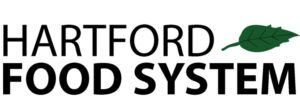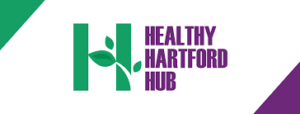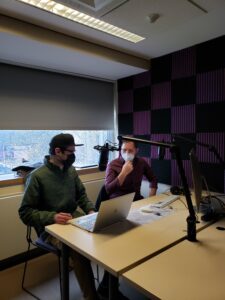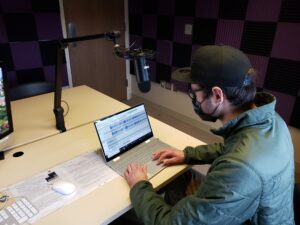“Writing for a Digital World” Course Partners with Hartford Food System
This semester, Visiting Assistant Professor Alex Helberg, in the Allan K. Smith Center for Writing in Rhetoric, is teaching RHET 125 “Writing for a Digital World,” where students seek to understand the influence of digital technologies on writing and communication practices. Borrowing from rhetorical theory on concepts like genre, discourse communities, intertextuality, and rhetorical ecologies, Helberg is teaching students how to write for public audiences through a Community Learning podcast project in partnership with Hartford Food System and Healthy Hartford Hub (HHH).

The class has been working with community partners Dani Singerman and Denise Holter at HHH who, after five years of work, are at a crucial point in attracting a grocery chain to start a location in the North End of Hartford. The timing of this collaboration has been helpful both to Helberg as he incorporates a real world component into the students’ final assignment and to Singerman and Holter, who are incorporating this podcast series into HHH communications plans. The interviewees for the series present “different sources of expertise, working directly with people who experience food security as well as people who study it from a big picture about the systemic issues.” It has been a “genuine exchange of expertise,” says Helberg, with Singerman coming into the class with her own expertise on teaching and food justice.
The students are interviewing people in the North End about what they want and how it would positively impact them if a grocery store opened there. They will also be interviewing and getting input from the project task force. The podcast series will be released Winter 2022-23 and include 10-15 minute episodes that will provide a snapshot of an array of community and expert perspectives. 
As the semester closes, Helberg’s students are working to make the audio recordings available in an archive for HHH to use in other digital communications. They are also working to ensure the podcast content is suitable for long-term use by their partners by time-stamping the audio for key themes and words and creating transcripts. Helberg describes this process as, “Composing for re-composition: How do you produce something knowing that it could be used for something else?”
As part of their coursework, students are considering questions about the pitfalls and promises of digital activism. Helberg says they’ve explored questions including, “How can this type of activism be helpful in the future? Why do some campaigns fail or flourish? What is digital advocacy good for? What makes it work? What are the potential risks of presenting people’s voices in audio format? How do we authentically present their voices?”

In addition to class discussions, the students listened to other podcasts on food justice to prepare for writing questions and interviewing. They read case studies of community-based podcasts that went well and others that went poorly. When it came time to do the interviews, they aimed to create a rapport with the interviewees before jumping into talking about food insecurity.
Jim Kreuger, a former Hartford resident who created a podcast on the history and implications of the construction of I-84 in Hartford, visited the class as another resource to build skills for podcasting. The class also visited StoryLabs, the on-campus professional grade podcasting studio. At the lab, they learned about podcasting software and how to use the space in the future if they are inspired to continue with podcasting.
 Helberg worked on developing this course as part of Community Learning Faculty Fellows (CLiFF). He’s applied skills learned in CLiFF to the creation and implementation of the course. He says CHER Director and Professor Abigail Fisher Williamson and Community Learning Director Erica Crowley have been instrumental in giving a strong set of guiding questions for how to think about projects, from the basics to the more complex. He has interrogated his own assumptions about what projects could look like and how to reflexively use the content in course to make his project partnerships better. “As someone coming into this as their first faculty job, it has been really enlivening to be part of a university community that is really invested in the surrounding community,” reflects Helberg.
Helberg worked on developing this course as part of Community Learning Faculty Fellows (CLiFF). He’s applied skills learned in CLiFF to the creation and implementation of the course. He says CHER Director and Professor Abigail Fisher Williamson and Community Learning Director Erica Crowley have been instrumental in giving a strong set of guiding questions for how to think about projects, from the basics to the more complex. He has interrogated his own assumptions about what projects could look like and how to reflexively use the content in course to make his project partnerships better. “As someone coming into this as their first faculty job, it has been really enlivening to be part of a university community that is really invested in the surrounding community,” reflects Helberg.
Summer 2023 update: The podcast is now out! Check it out here or wherever you get your podcasts.
